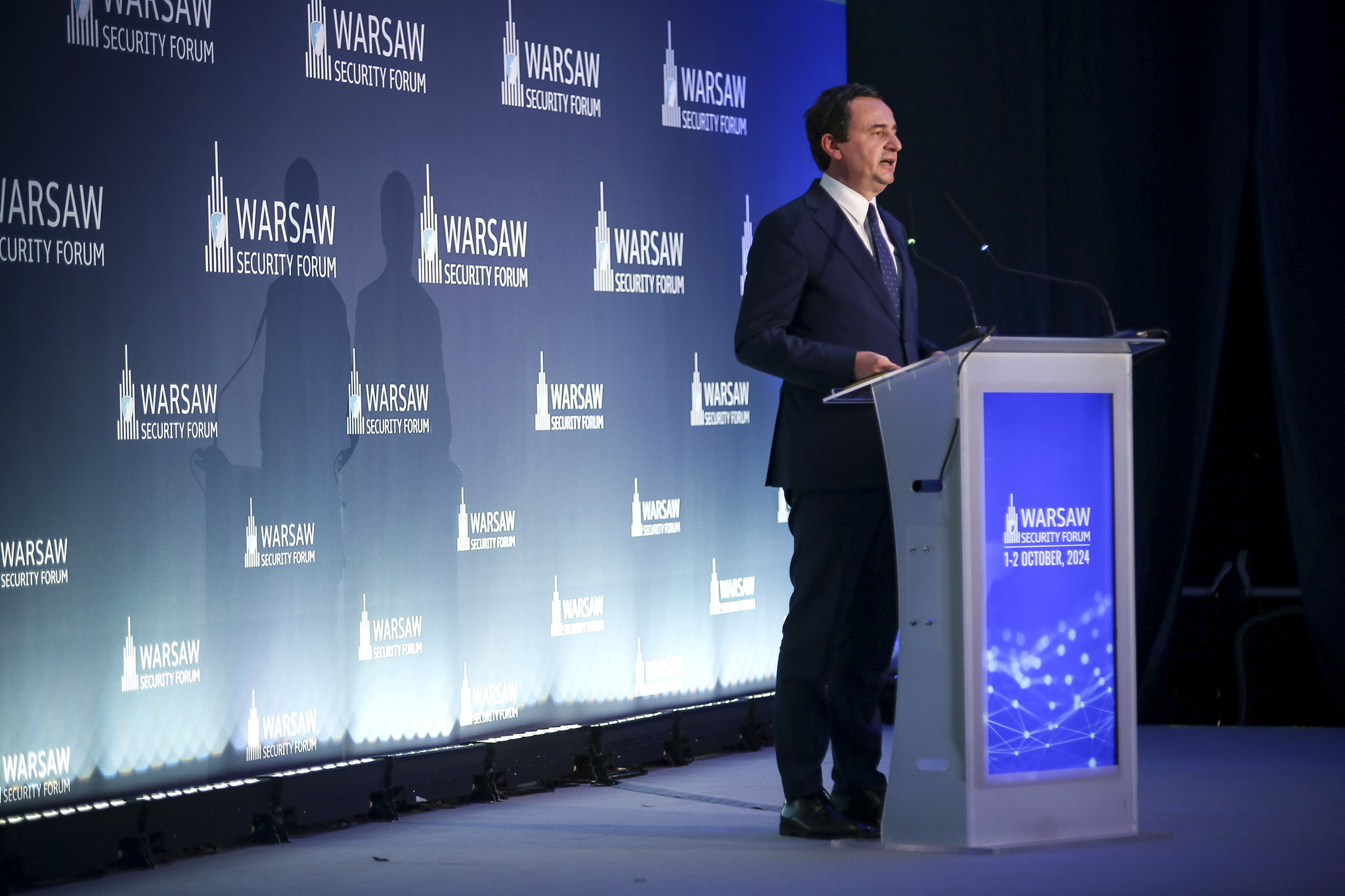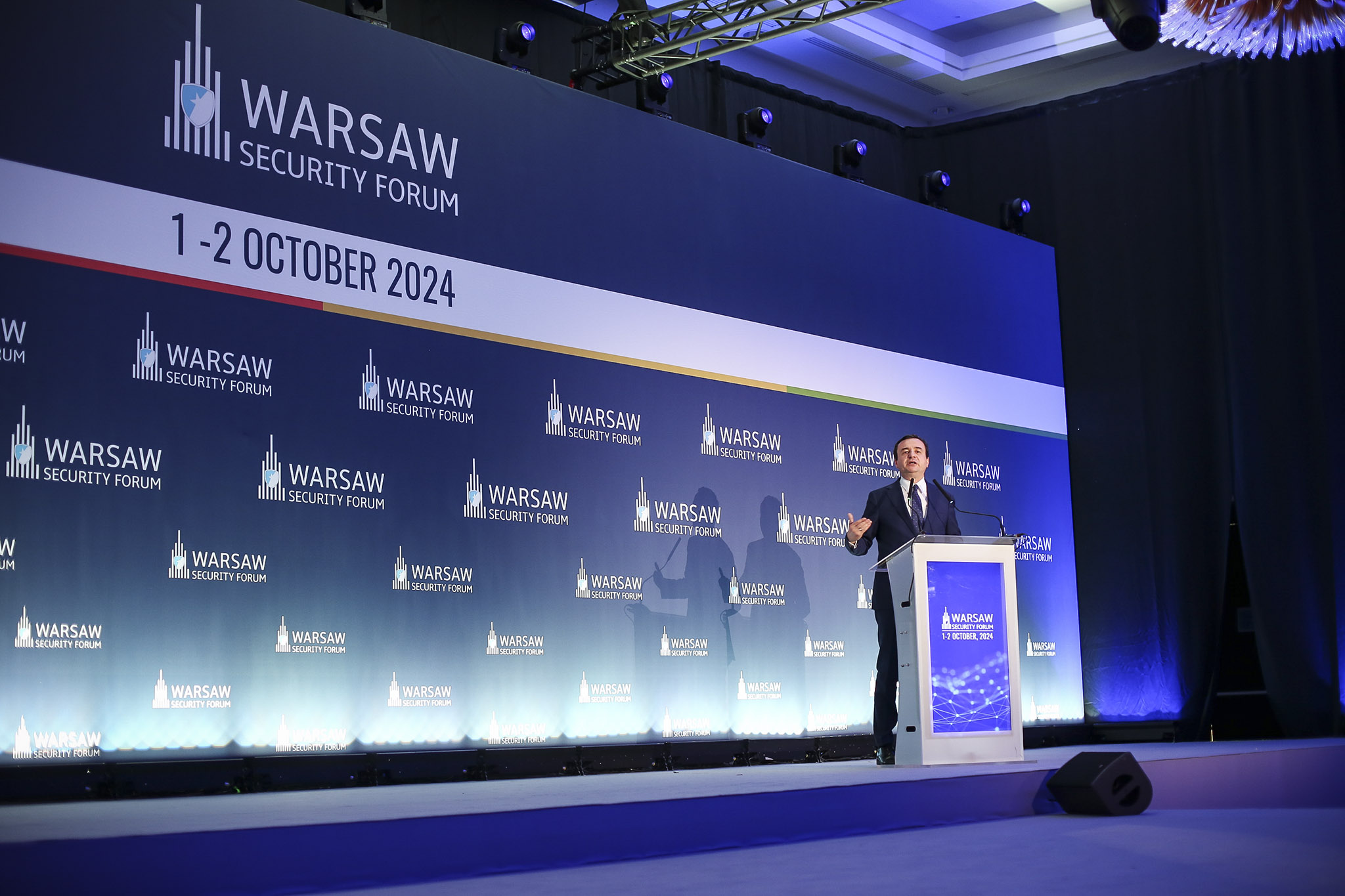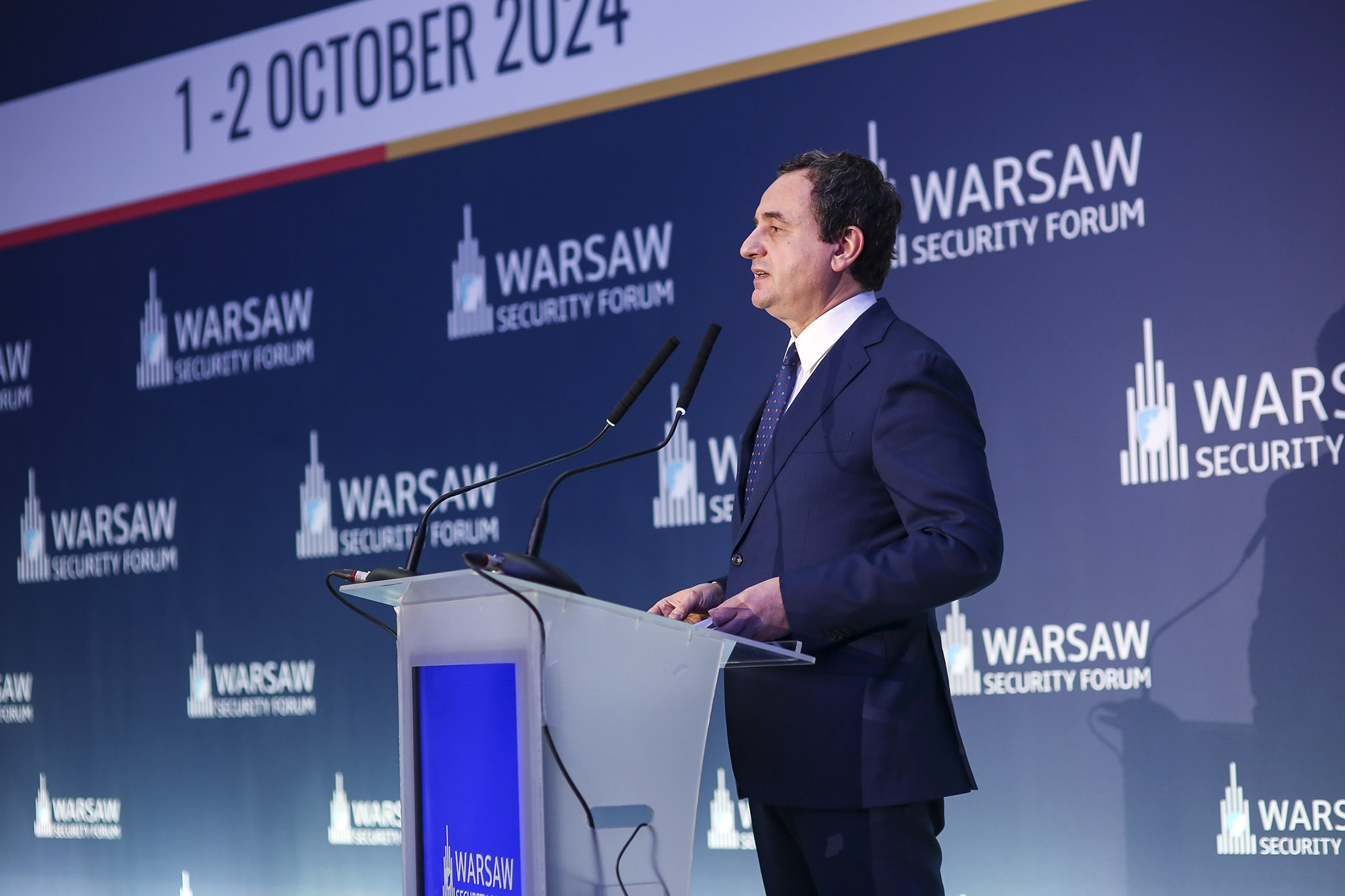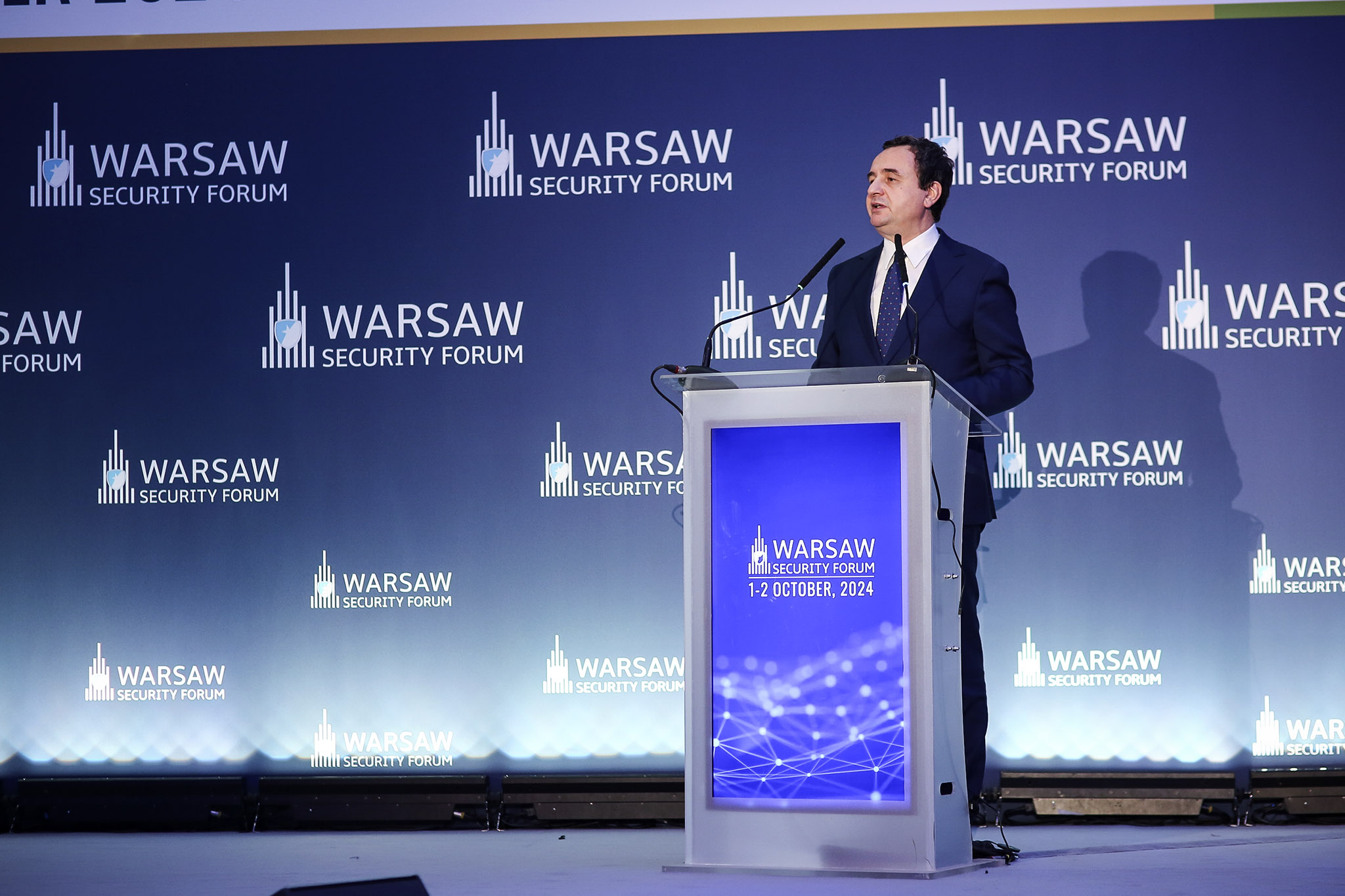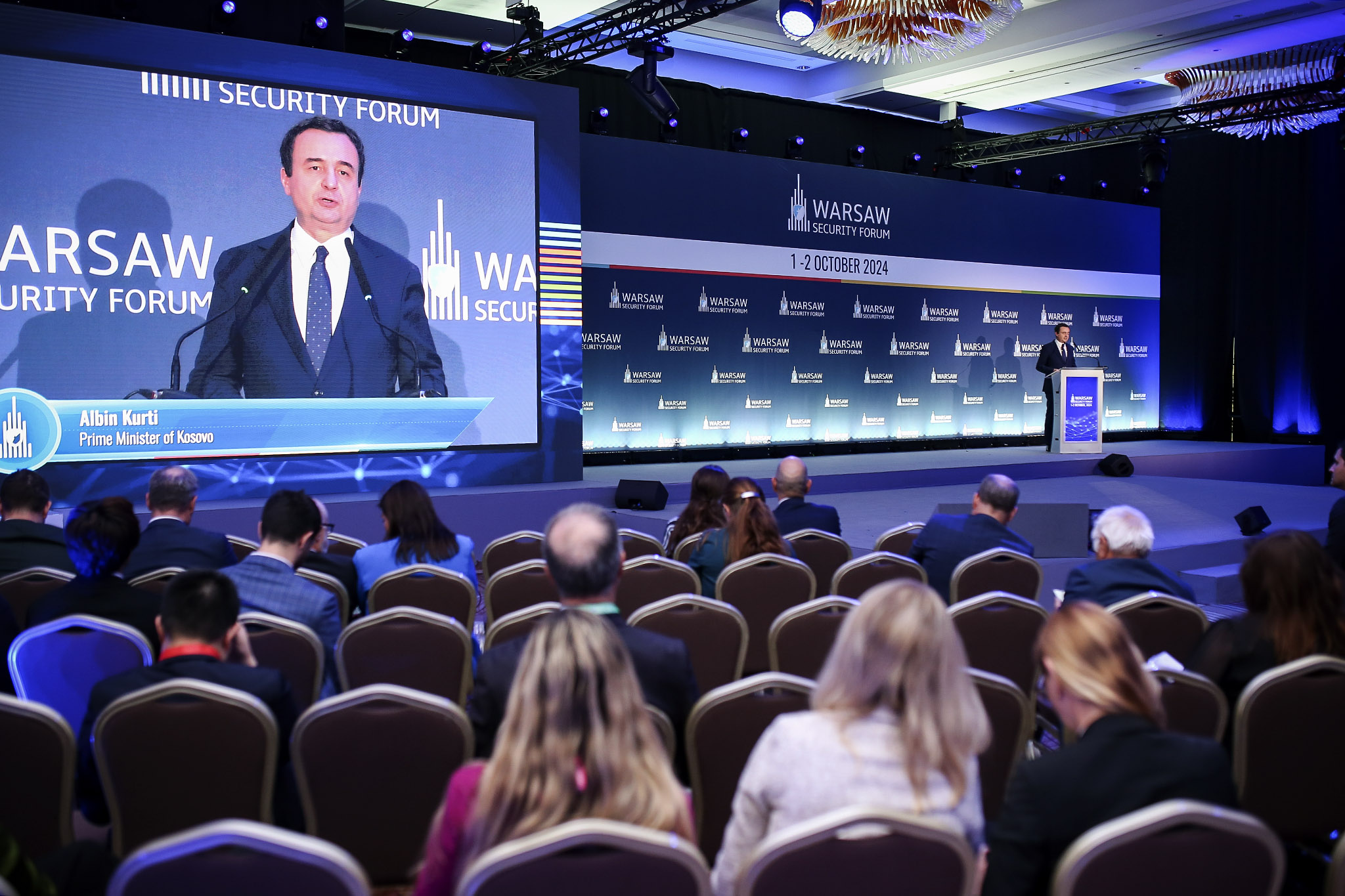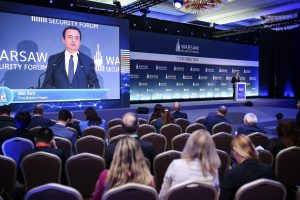Varshavë, 1 tetor 2024
Kryeministri i Republikës së Kosovës, Albin Kurti, mbajti një fjalim mbi temën ndërlidhjes mes Gjeopolitikës dhe Integrimit Evropian, me vëmendje të veçantë te Ballkani Perëndimor, në kuadër të sesioneve të Forumit të Varshavës për Siguri (WSF).
Në fjalën e tij, kryeministri foli për situatën e sigurisë në Evropë dhe rajon dhe rrezikun që paraqesin Rusia dhe Serbia.
“Sot, siguria rajonale në Evropë është siguri kolektive për Evropën. Ajo që ndodh në Ukrainë apo Poloni, në vendet e Partneritetit Lindor dhe në rajonin tonë të Ballkanit Perëndimor, prek jo vetëm kontinentin, por gjithë botën. Për ne në Ballkanin Perëndimor, e veçanërisht për Republikën e Kosovës, integrimi i plotë euroatlantik në NATO dhe Bashkimin Evropian, mbetet qëllimi përfundimtar i sigurisë. Kjo, krahas aftësive të mjaftueshme mbrojtëse dhe marrëveshjeve dypalëshe të sigurisë me aleatët tanë më të afërt, formon një ombrellë solide sigurie. Ashtu si Rusia, NATO dhe BE kanë një histori zgjerimi. Por ndryshe nga Rusia, zgjerimi i tyre ka ecur në një mënyrë paqësore dhe demokratike.” u shpreh Kryeministri Kurti.
Ai foli për rëndësinë e zgjerimit të BE-së dhe NATO-s, integrimin e Kosovës dhe rritjen e bashkëpunimit, si kundërpërgjigje ndaj influencës ruse.
“Në rajonin tonë nuk ekziston asnjë kërcënim më i madh se agresioni serb dhe rreziku që ndikimi rus të punojë së bashku me atë agresion. Fatkeqësisht, e njëjta Serbi që nën regjimin e Millosheviqit në vitet e 90-ta kreu gjenocid në Bosnjë dhe Kosovë, vazhdon të kërcënojë pa u penduar. Serbia minon paqen në Ballkanin Perëndimor duke shkelur sovranitetin dhe integritetin territorial të fqinjëve të saj, përfshirë Kosovën. Vitin e kaluar, aksionet e njëpasnjëshme agresive të Serbisë kulmuan me një sulm terrorist në Banjskë të Zveçanit më 24 shtator 2023. Militantë të armatosur të trajnuar në Serbi, me armatim prej miliona euro, hynë në vendin tonë, duke organizuar një sulm nga Manastiri Ortodoks i Banjskës. Qëllimi i tyre ishte të përsërisnin veprimet e Rusisë të vitit 2014 në Donbas.” tha Kryeministri.
Shtoi se Kosova nuk po mbron vetëm integritetin territorial, sovranitetin, kushtetutshmërinë dhe ligjin, njerëzit dhe shoqërinë, por edhe prosperitetin dhe progresin e arritur veçanërisht në tre vitet e fundit.
“Ne duhet të mbështesim fitoren e Ukrainës, të parandalojmë përhapjen e ndikimit dashakeq të Rusisë dhe të ringjallim procesin e integrimit në BE të Ballkanit Perëndimor. Kosova mirëpret presidencën e Polonisë të BE-së në janar 2025. Më 15 dhjetor 2022, Kosova zyrtarisht aplikoi për anëtarësim në BE.
Ne jemi të përkushtuar ndaj procesit të reformave dhe bashkëpunimit rajonal, duke ruajtur vlerat evropiane.” përfundoi Kryeministri Kurti, duke ritheksuar dhe përkushtimin e Kosovës për normalizimin e marrëdhënieve me Serbinë, ecjen tutje dhe angazhimin konstruktiv në proces.
Përkthimi jozyrtar i fjalës së plotë të Kryeministrit Kurti:
Të nderuar përfaqësues të Republikës së Polonisë,
Drejtues të qeverive dhe zyrtarë të tjerë,
Të nderuar ekspertë,
Zonja dhe zotërinj,
Të dashur miq,
Dzien dobry!
Jam shumë i lumtur dhe i nderuar që jam këtu në mesin tuaj në Forumin e Varshavës për Siguri. Është hera ime e parë në këtë vend të bukur, me një histori të pasur dhe mbresëlënëse që e admiroj thellësisht.
Nuk mund se si mos ta theksoj se po mblidhemi këtu së bashku në një ditë të veçantë: 100-vjetorin e ditëlindjes së ish-presidentit amerikan Jimmy Carter. Është e vështirë të gjesh një mjedis më të përshtatshëm se ky, Forumi i Varshavës për Siguri, për të festuar atë që ne mund t’i referohemi tani si “Carter centennial”.
Presidenti Carter – si gjatë mandatit të tij ashtu edhe për një kohë të gjatë pas përfundimit të mandatit të tij si president – ia kushtoi jetën promovimit të paqes dhe sigurisë globale. Dhe në këtë përpjekje të shenjtë, Polonia është ajo që i dha atij, dhe Shteteve të Bashkuara, një nga dhuratat më të mëdha: Këshilltarin e shquar polako-amerikan për Sigurinë Kombëtare dhe studiuesin e marrëdhënieve ndërkombëtare, i lindur në Varshavë, Zbigniew Brzezinski.
Ndër perlat e urtësisë së Presidentit Carter erdhi në vitin 1980, si përgjigje ndaj pushtimit të Afganistanit nga Bashkimi Sovjetik. Në fjalimin e tij drejtuar popullit amerikan në atë rast të tensionuar, ai tha, e citoj: “Historia jep, ndoshta, shumë pak mësime të qarta. Por sigurisht një mësim i tillë i nxjerrë nga bota me çmim të lartë është se agresioni i pa kundërshtuar, bëhet një sëmundje ngjitëse. Përgjigja e bashkësisë ndërkombëtare ndaj përpjekjes sovjetike për të shtypur Afganistanin duhet të përputhet me peshën e veprimit sovjetik.”
Paralelja me botën tonë sot besoj se është e qartë për të gjithë. Dyzet e katër vjet më vonë, ndërsa Ukraina tani e gjen veten në shënjestër të agresionit autoritar – që po kryhet tani nga Federata Ruse – le të shpresojmë se nuk do të na duhet të mësojmë edhe një herë mësimin e historisë.
i fundit i Suedisë dhe Finlandës në NATO, shërben si shembull i vullnetit dhe dëshirës në rritje të vendeve të BE-së për t’u anëtarësuar në NATO. Në të vërtetë, BE-ja ka nevojë për NATO-n në këtë shekull ndoshta edhe më shumë se në atë paraprak.
Për dallim me Ballkanin Perëndimor, ku janë vendet e NATO-s ato që kërkojnë të anëtarësohen në BE, pasi është bërë e qartë se Serbia nuk mërzitet që ta ngacmoj secilin nga fqinjët e saj që nuk janë vende anëtare të BE-së – përfshirë edhe ato që janë anëtarë të NATO-s, përkatësisht Malin e Zi dhe Maqedoninë e Veriut dhe vendin tim, Republikën e Kosovës, e cila ende nuk është e integruar në NATO, por e ka NATO-n të integruar brenda saj.
Ata sigurisht kishin artilerinë e rëndë të nevojshme për ta bërë këtë. Pas sulmit, Policia jonë sekuestroi 105 lloje të ndryshme armësh zjarri, mbi 80.000 fishekë, 140 granata dore, 9 mina kundër personit, 36 detonatorë dhe më shumë se 52 raketahedhës.Pra, nuk është ekzagjerim të thuhet se, më 24 shtator, policia jonë jo vetëm që po mbronte Kosovën, por edhe po parandalonte hapjen e një konflikti të ri të armatosur, të mbështetur nga Serbia dhe Rusia, i cili mund të kishte pasoja të rënda ndërkombëtare. Ndërsa Serbia vazhdon të destabilizojë veriun e Kosovës, Rusia kërkon të largojë vëmendjen nga Ukraina dhe të përshkallëzojë konfliktin diku tjetër. Banjska paraqiti një mundësi e përkryer për të dy palët.
Paketa jonë e dytë e ndihmës ushtarake për Ukrainën, e përbërë nga predha mortajash, u miratua këtë vit, pas paketës së parë të kamionëve dhe veturave taktike. Për më tepër, në bashkëpunim me Ministrinë e Mbrojtjes së Mbretërisë së Bashkuar, në kuadër të operacionit Interflex, po trajnojmë rekrutët ukrainas në taktikat luftarake – 34,000 deri më tani.
Shoqëria jonë civile ka ndarë gjithashtu me homologët ukrainas përvojën tonë në trajtimin e traumave nga dhuna seksuale e lidhur me konfliktin.
Shkurt, Kosova qëndron me Ukrainën pa kushte dhe në harmoni të plotë me politikën e jashtme dhe të sigurisë evropiane.
Të dashur miq,
Në fillim të këtij viti, Ministri i Jashtëm i Polonisë Radosław Sikorski foli për një zgjerim të dyanshëm të BE-së, duke përforcuar si Lindjen ashtu edhe Ballkanin Perëndimor. Ne duhet të mbështesim fitoren e Ukrainës, të parandalojmë përhapjen e ndikimit keqdashës të Rusisë dhe të energjizojmë procesin e pranimit në BE për Ballkanin Perëndimor.
Kosova mezi e pret presidencën e Polonisë në BE-në në janar 2025. Më 15 dhjetor 2022, Kosova zyrtarisht aplikoi për anëtarësim në BE. Ne jemi të përkushtuar ndaj procesit të reformave dhe bashkëpunimit rajonal, duke ruajtur vlerat evropiane.
Rikonfirmoj përkushtimin tim për normalizimin e marrëdhënieve ndërmjet Kosovës dhe fqinjit tonë verior Serbisë dhe për t’u angazhuar në mënyrë konstruktive në procesin për ta çuar përpara. Ka shumë punë përpara, por kam besim se, së bashku, ne mund të kemi sukses.
Ju falemnderit shumë.
Fjala e plotë e Kryeministrit Kurti në gjuhën angleze:
Dear representatives of the Republic of Poland,
Government leaders and other officials,
Esteemed experts,
Ladies and gentlemen,
Dear friends,
Dzien dobry!
I am very happy and honored to be here amongst all of you at the Warsaw Security Forum. It is my first time in this beautiful country, one with a rich and impressive history that I deeply admire.
I cannot help but note that we are gathering here together on a special day: the 100th birthday of former U.S. President Jimmy Carter. It’s hard to think of a more appropriate setting than this one, the Warsaw Security Forum, in which to celebrate what we may now refer to as the “Carter centennial.”
President Carter — both during his term in office and for a long time after — dedicated his life to the promotion of global peace and security. And in this sacred effort, it was none other than Poland that gave to him, and to the United States, one of the greatest of gifts: the distinguished Polish-American National Security Advisor and international-relations scholar born in Warsaw, Zbigniew Brzezinski.
Among President Carter’s pearls of wisdom came in 1980, in response to the Soviet Union’s invasion of Afghanistan. In his address to the American people on that tense occasion, he stated, I quote him: “History teaches, perhaps, very few clear lessons. But surely one such lesson learned by the world at great cost is that aggression, unopposed, becomes a contagious disease. The response of the international community to the Soviet attempt to crush Afghanistan must match the gravity of the Soviet action.”
I trust that the parallel to our world today is obvious to everyone. Forty-four years later, as Ukraine now finds itself the target of authoritarian aggression — now perpetrated by the Russian Federation — let us hope that we will not have to learn history’s lesson once again.
President Carter today is celebrating his birthday. He just turned 100, and we wish him good health and a great day today.
But here I understand we are in the midst of a time of mourning for the Polish people. I express my sincere wishes and hopes for a speedy recovery from the devastating floods in the south of Poland, and my condolences for the lives lost.
We stand by Poland at this difficult time, and we stand together as two countries strengthening our bilateral relations. In this respect, I am proud to announce that we have recently created our first-ever mission in Poland.
We are deeply grateful for Poland’s 25th anniversary of deploying troops to the NATO KFOR mission in Kosova. This was Poland’s first international military mission with NATO. Its contribution not only helped liberate Kosova, but has also enabled us to become a force for peace and stability. On May 27th, Kosova became a NATO Parliamentary Assembly Associate Member, opening the door for our people to give back and contribute to safeguarding and promoting democratic values alongside our allies.
Today, regional security in Europe is collective security for Europe. What happens in Ukraine or Poland, in countries of the Eastern Partnership, and in our region of the Western Balkans, affects not only the continent but the entire world.
For us in the Western Balkans, and particularly for the Republic of Kosova, full Euro-Atlantic integration into NATO and the European Union, remains the ultimate security goal. This, alongside sufficient defense capabilities and bilateral security agreements with our closest allies, forms a solid security umbrella.
Like Russia, NATO and the EU have a history of enlargement. But unlike Russia, their expansion has proceeded in a peaceful and democratic fashion.
The respective projects of EU and NATO enlargement are not unrelated; rather, they go hand-in-hand, and serve to protect and promote the security of the entire European continent — and with it, the world.
This truth is borne out by the behavior of the EU and NATO countries themselves. The memberships of these two organizations overlap, though not completely.
Some EU member states are not part of NATO, just as some NATO member states are not part of the EU.
But there seems to be a trend toward greater alignment in their respective memberships, achieved through the prospective enlargement of both organizations among countries in Europe. Sweden and Finland’s recent accession to NATO, serves as an example of EU countries’ increasing willingness and desire to join NATO. Indeed, the EU needs NATO in this century perhaps even more than in the previous one.
By contrast, in the Western Balkans, it is the NATO countries that are seeking to join the EU, as it has become apparent that Serbia has no qualms about harassing every one of its neighbors that are not EU member states — including even the ones that are members of NATO, namely Montenegro and North Macedonia and my country, Republic of Kosova, which is still not integrated in NATO but has NATO integrated into itself.
So, in northern Europe the EU wants to join NATO, whereas in the Western Balkans, it is NATO that wants to join the EU. There is, then, at least this performative or behavioral demonstration of the thesis that peace and security on the European continent is best served through the enlargement of both organizations. The EU and NATO can together attain more than either can achieve on its own.
I am well aware that Poland commits 4.3% of its GDP to defense and plans to increase this to 4.7% by 2025. Kosova currently commits 2% of its GDP to defense, meeting the NATO target, and we are determined to progressively increase this commitment in line with the threat level Kosova faces, either as a country or as a partner in peacekeeping endeavors among allied forces.
We agree with Poland that more collective defense spending is necessary, and we share the United States’ view that a greater share of this spending must come from European allies.
Ladies and gentlemen,
The lack of Euro-Atlantic integration, even on legitimate grounds, creates a reasonable wariness and a real risk of conflict in our region. Conflicts in the Western Balkans have historically arisen from attempts to subjugate and colonize other nations, driven by hegemonic aggression and Russia’s malign influence.
In our region, no greater threat exists than Serbian aggression and the danger of Russian influence working in tandem with that aggression. Unfortunately, the same Serbia that, under the Milosevic regime in the 90’s committed genocide in Bosnia and Kosova, continues to threaten without repent.
Serbia undermines peace in the Western Balkans by violating the sovereignty and territorial integrity of its neighbors, including Kosova. Last year, successive aggressive actions by Serbia culminated in a terrorist attack in Banjska, in Zveçan on September 24, 2023. Armed militants trained in Serbia, with millions of Euros worth of armaments, entered our country, staging an attack from the Banjska Orthodox Monastery. Their aim was to replicate Russia’s 2014 actions in Donbas.
They certainly had the heavy artillery necessary to do so. After the attack, our Police sequestrated 105 different types of firearms, over 80,000 rounds of ammunition, 140 hand grenades, 9 anti-personnel mines, 36 detonators, and more than 52 rocket launchers.
And so, it is no exaggeration to say that, on September 24th, our police were not just protecting Kosova but also preventing the opening of a new armed conflict, backed by Serbia and Russia, which could have had severe international repercussions. While Serbia continues to destabilize the north of Kosova, Russia seeks to distract attention from Ukraine and escalate conflict elsewhere. Banjska presented a perfect opportunity for both.
If it had been successful, the attack would have led to a higher concentration of NATO forces in Kosova, thereby pulling limited military resources away from Ukraine. This would then have created an opening for Russia to escalate its conflict in Ukraine and even to extend it further into Europe.
Dear esteemed colleagues,
We are not just protecting the sovereignty of our young and democratic republic, we are also indirectly fighting Russia, which in our region acts in close collaboration with Serbia. Offering carrots to Serbia in the hope of peaceful reform is not the solution and definitely is not working. Instead, we must implement active safeguards against all those who threaten peace and security in the Western Balkans.
It is essential that Kosova’s institutions, which our allies helped build, are present in the north, especially those related to peace and security. The more our institutions are present, the greater the stability, leading to prosperity and reducing the chances of provocation or conflict. And we have to defend not only territorial integrity, state sovereignty, constitution and law, people and society. We also have to defend prosperity, we have to defend the progress. In three years only in Kosova our GDP grew by 33%. In only three years, we doubled our exports and more than doubled FDI. In only three years, we became a champion in the Western Balkans in terms of democratic progress, by coming out first according to Freedom House, Transparency International, Reporters Without Borders, World Justice Project, V-dem Institute, showing that economic growth and democratic progress go hand-in-hand. Therefore, when we speak of defending and securing and protecting, it is not only that we have to do this to our being, but also to our doing; not merely what we have, but also what is in the making. So defending the progress, becomes the same as defending people.
My government is working hard toward this goal. We have established fully operational police stations, gas stations, and supermarkets in the four municipalities in the north, supported by our government. Routine administrative processes such as business registration and the issuance of utility bills have begun to be carried out without fanfare. This represents real progress on the path to normalcy for our citizens in the north. We are committed to providing security and prosperity for all, regardless of what ethnic, religious, or other community they belong to.
But the threat is not over. While we hope that Sergeant Afrim Bunjaku will be the last victim, we remain vigilant. Now more than ever, we need NATO’s support, Poland’s support, and the support of all our allies to protect and promote our shared interests.
Kosova has proven itself more than ready to do its part as well, especially in the defense of Ukraine. To that end, we have adopted all EU and U.S. sanctions packages against Russia, Belarus, and their proxies. Our Parliament has approved a resolution to house up to 5,000 Ukrainian refugees, and we have hosted 21 Ukrainian journalists under temporary protection. Additionally, Kosova has joined the Demining Coalition within the Ukraine Defense Contact Group, and over 100 Ukrainians have been trained in demining by our military.
Our second package of military aid for Ukraine, consisting of mortar rounds, was approved this year, following the first package of trucks and tactical vehicles. Furthermore, in cooperation with the Ministry of Defense of the United Kingdom, in the context of the Interflex operation, we are currently training Ukrainian recruits in combat tactics — 34,000 thus far.
Our civil society has also shared with Ukrainian counterparts our experience in dealing with trauma from conflict-related sexual violence.
In short, Kosova stands with Ukraine unconditionally and in full alignment with European Foreign and Security Policy.
Dear friends,
Earlier this year, Poland’s Foreign Minister Radosław Sikorski spoke of a bi-directional EU enlargement, reinforcing both the East and the Western Balkans. We must support Ukraine’s victory, prevent Russia’s malign influence from spreading, and reinvigorate the EU accession process for the Western Balkans.
Kosova looks forward to Poland’s EU presidency in January 2025. On December 15, 2022, Kosova formally applied for EU membership. We are committed to the reform process and regional cooperation, while safeguarding European values.
I reaffirm my commitment to normalizing relations between Kosova and our northern neighbor Serbia and to constructively engage in the process to move it forward. There is much work ahead, but I am confident that, together, we can succeed.
Thank you very much.

